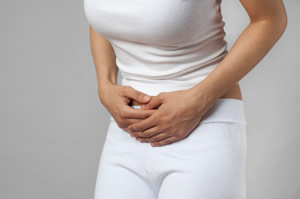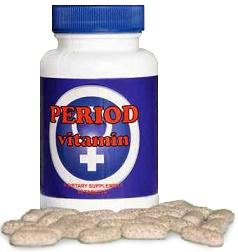What Are Symptoms Of PMS?
Premenstrual Syndrome (PMS) is a common problem among women. In fact, the hormonal changes that your body undergoes during and prior to your monthly period are completely natural. However, that doesn't mean that they're always enjoyable. Luckily, there are ways to treat PMS, but what are symptoms of PMS?
That's a question that bothers a lot of people. Do you have PMS? Do you have PMDD? Are you just simply having a bad day? You can't treat PMS unless you can identify it, but it can present itself in dozens of different ways. So, you have to be be prepared to recognize PMS symptoms.
Symptoms Vary:
Before we even examine individual Premenstrual Syndrome symptoms, you have to know that symptoms vary from person to person, or even in the same person from month to month. It all depends on hormonal and chemical factors.
Behavioral Issues:
Behavioral issues make up a large part of PMS symptoms. In fact, when most people think of PMS all they think of are severe mood swings.
 |
If you suffer from PMS, you may find yourself in “an emotional funk” for a week or more, between the time that you ovulate and when the actual bleeding begins. In fact, it could last for a day or two after the bleeding starts, too. How the emotional side of PMS will affect you depends on your usual mood, as well as the various different nutritional, chemical and hormonal changes going on inside your body after you ovulate. You might feel anything from being a little bit anxious to being highly irritable. |
If you experience the emotional side of PMS, you may find yourself crying for “no reason” as well. There really is a reason. Your hormones are simply out of whack. Nevertheless, depression, anxiety, fast mood changes and withdrawal from your family are things that you don't have to just put up with.
Memory And Cognition Issues:
Another PMS problem is that you could experience memory and cognition issues. More accurately, you could find yourself having trouble concentrating on even the simplest of tasks. You may feel very tired, or you may just feel far too easily distracted.
Physical Issues:
 There are well over 100 symptoms associated with PMS and most of them fall in the category of physical issues. A couple of those issues have to do with the breasts. Your breasts may become tender when you have PMS, for instance. Your nipples might even produce a sort of discharge when pressed. Although that is a fairly common symptom, you may want to get it checked by a doctor, especially if it happens on its own without pressing or squeezing.
There are well over 100 symptoms associated with PMS and most of them fall in the category of physical issues. A couple of those issues have to do with the breasts. Your breasts may become tender when you have PMS, for instance. Your nipples might even produce a sort of discharge when pressed. Although that is a fairly common symptom, you may want to get it checked by a doctor, especially if it happens on its own without pressing or squeezing.
You may also find that your physical appearance changes a bit when you have PMS. For example, you might experience acne outbreaks that only occur between ovulation and the start of your menstrual bleeding. You also may find that you gain weight or become temporarily bloated, since those are common symptoms of Premenstrual Syndrome.
What's The Difference Between PMS and PMDD:
If you have Premenstrual Dysphoric Disorder (PMDD) your symptoms will be like that of PMS, but much more severe. PMDD can make you miss work and school and give you feelings of hopelessness. You may even feel suicidal at times. If that's the case, you should seek medical help at once.
PMS Treatments:
If you do have regular PMS, you can treat it. Some of the best treatments are the all natural kind. After all, prescription medications don't support the body or treat the root cause of PMS. They just cover up the symptoms and often come with side effects that can be worse than the PMS itself. There are many great herbal treatments that can really help you to cure PMS problems.
Calcium And Magnesium:
The relationship between calcium and magnesium is especially important, if you want to restore balance to your body during times that PMS symptoms are at their worst.
 |
Calcium is capable of controlling fluid retention within your body. That should mean less weight gain, bloating and cramping. The only problem is that calcium isn't easily absorbed on its own. Taking magnesium will help your body to make better use of the calcium that you take. |
Calcium Carbonate |
Folic Acid And Vitamin E:
Folic acid and vitamin E are also two ingredients that can be great for relieving symptoms of Premenstrual Syndrome. However, they primarily help with moodiness and the mental aspects of PMS. In fact, folic acid can even relieve the tension headaches that can plague some women with PMS.
White Willow Bark:
White willow bark is another ingredient that is known for bringing about natural PMS relief. It is a general pain killer. In fact, for centuries willow bark has been used to treat all sorts of ailments, including pain and fevers. It used to be primarily steeped into a tee, but it can also be found in supplement pill form, these days.
Combining Everything:
Man-made medications don't really treat your entire body and they certainly don't really support healing. Not only that, but there can be drug interactions. So, you may not even be able to take an average PMS medication, if you happen to be taking other pills for other ailments.
 One of the best things about natural remedies is that you can combine several of them at once. It isn't like taking man-made medications, which often can't be mixed together. In fact, there are a lot of herbal supplement pills that contain several herbs, minerals and vitamins together. One of the best of those that are designed to treat PMS is a supplement called Period Vitamin, which also contains evening primrose, niacin and a number of other substances for PMS relief.
One of the best things about natural remedies is that you can combine several of them at once. It isn't like taking man-made medications, which often can't be mixed together. In fact, there are a lot of herbal supplement pills that contain several herbs, minerals and vitamins together. One of the best of those that are designed to treat PMS is a supplement called Period Vitamin, which also contains evening primrose, niacin and a number of other substances for PMS relief.
So, what are symptoms of PMS really good for? Well, they aren't really good for anything at all. You don't need them and you don't want them, so why settle for them? Take an herbal supplement, eat a healthy diet, get plenty of exercise and get enough sleep. Those are the only things that most women need in order to achieve PMS relief.